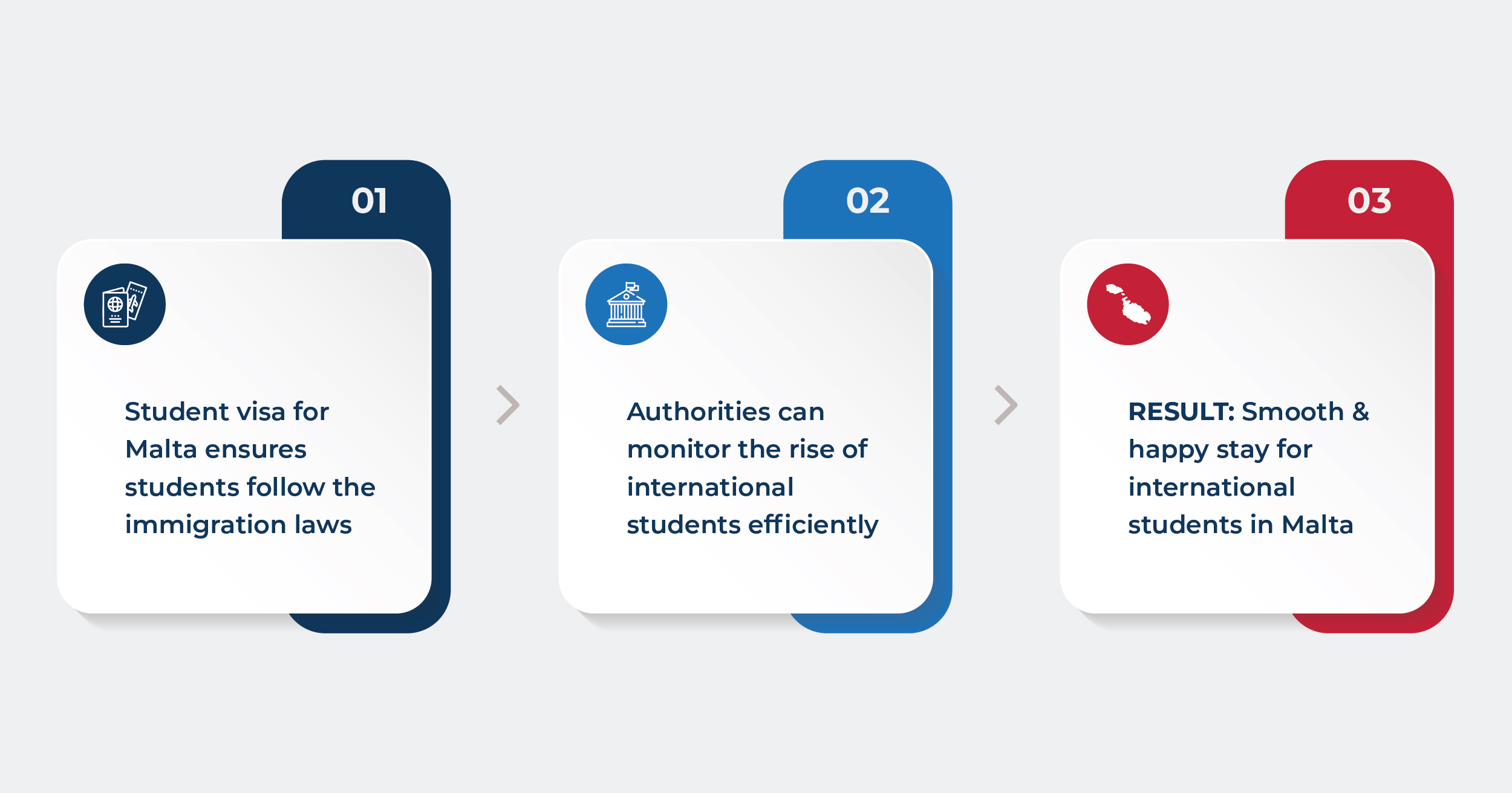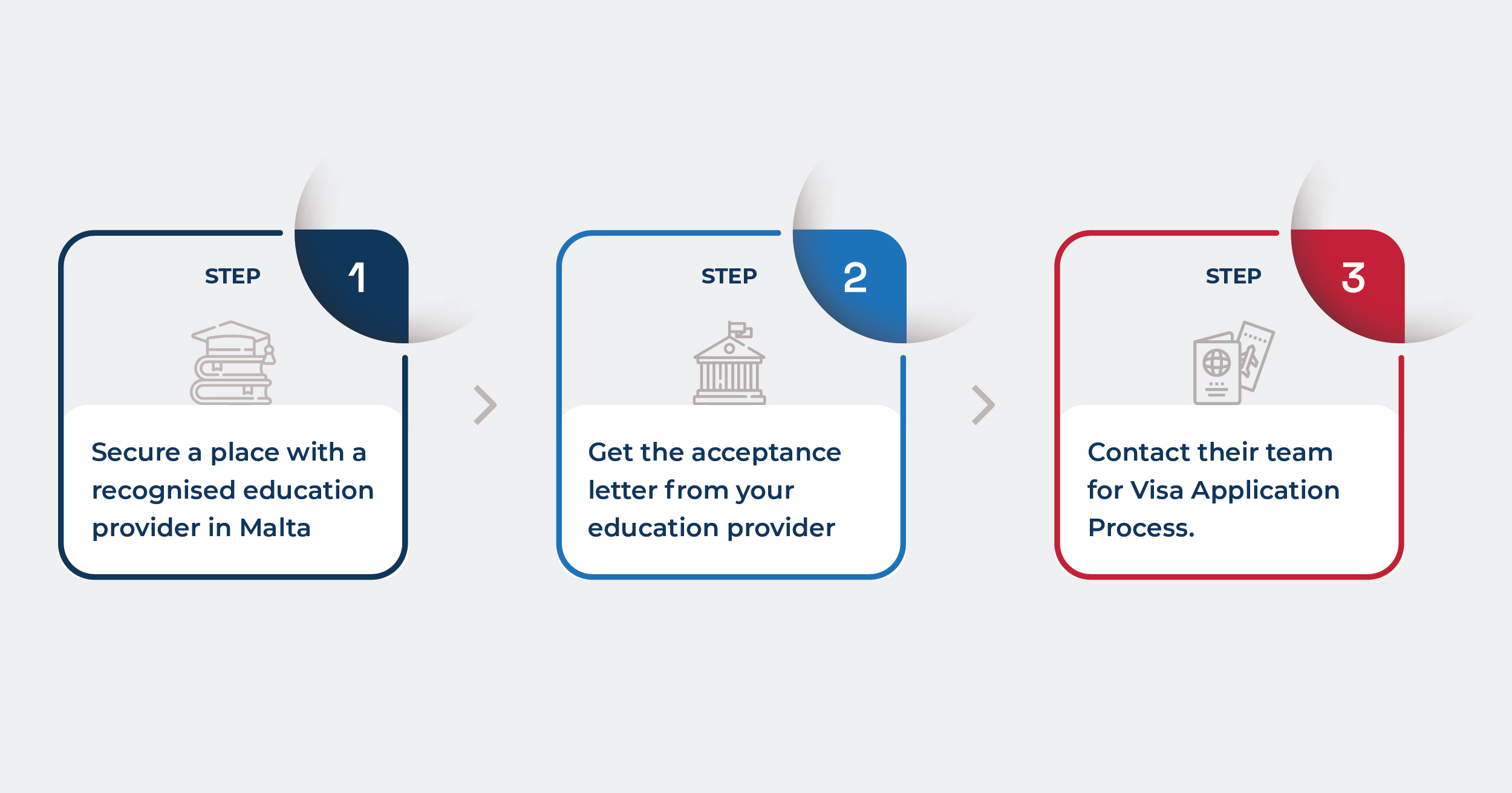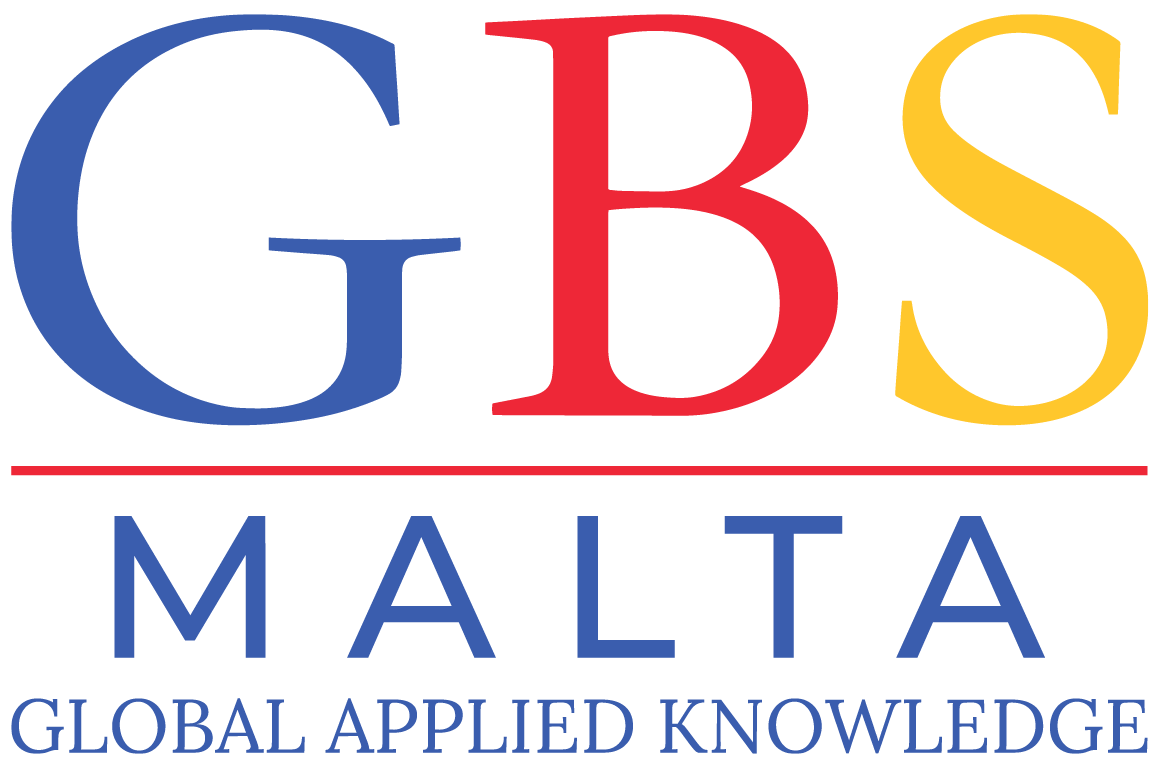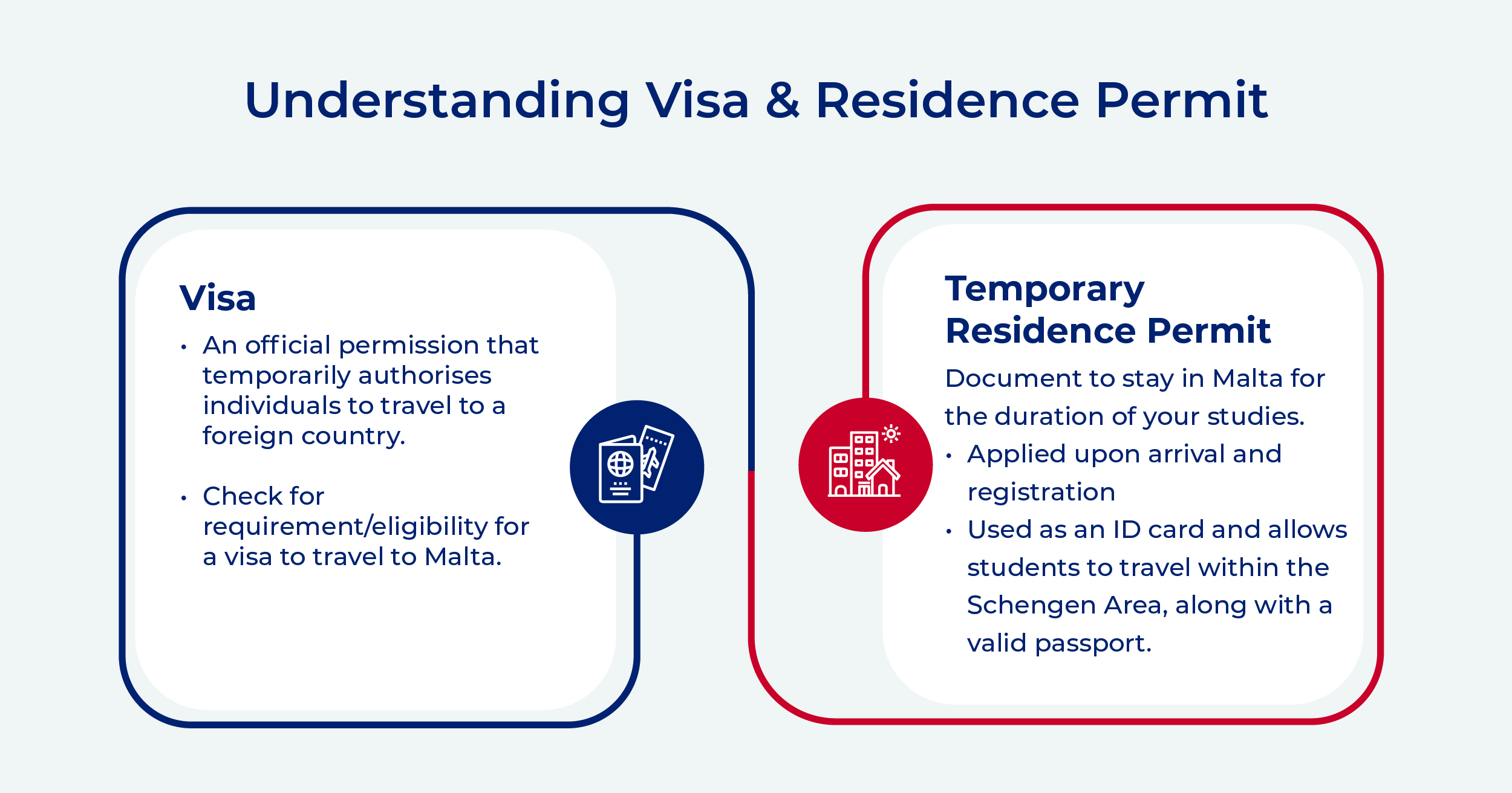The visa fee varies by country. For 2024, €300 divided in two fees of €150.
Do I need a student visa for Malta to pursue higher education?
Yes, if you are an international student from a non-EU/EEA country, you will need a student visa to study in Malta. EU/EEA students do not require a visa but must register with the local authorities in Malta upon arrival.

For non-EU/EEA students, obtaining a student visa is a crucial step to reside and study in Malta legally. If you plan to study at GBS Malta, you'll be enrolled in a full-time bachelor’s, master’s and award degree course. Since these courses last more than three months, non-EU/EEA/Swiss nationals will need a Temporary Permit to stay and study in Malta.
Study in Malta today
Student visa for Malta application process
Applying for a student visa for Malta might seem to be a lengthy process. Let’s break it down into steps:

Here is the process you will undertake at GBS Malta:
Step 1: Once you receive the offer letter and make a tuition fee payment, you will receive the list of visa documents from the GBS Malta visa team.
Step 2: The Visa officer in charge collects all documents from you according to the checklist for visa application and will send them to the Malta compliance team.
Step 3: Once all documents are complete and approved, the visa support letter will be issued.
Step 4: The compliance team will proceed to book the VFS appointment. You will receive directly from VFS the appointment confirmation on your e-mail.
Step 5: You will receive all documents with the instructions to attend the VFS appointment from the Visa Officer.
Step 6: You must go to the VFS centre to submit your documents and passport. You need to pay an extra fee directly to VFS.
Step 7: After submission of documents, you may be called for an online interview. You will be notified of the date and time of the interview via e-mail. The Central Visa Unit officer conducts the interviews.
Step 8: After 12 weeks, the VFS centre will contact you to coordinate the passport collection/delivery.
The process may also include an interview where you will be asked about your study plans and intentions at GBS Malta. Make sure you prepare well. Be honest in explaining your goals clearly to ensure a smooth interview process.
Supporting documents for a student visa for Malta
To support your Malta study visa application, you need the following documents:
Visa Application Form
- Recent Passport sized photo
- Valid passport/travel document
- Travel medical insurance
- Confirmed travel itinerary
- Original letter of acceptance from GBS Malta
- Bank statements (last three months from the date of visa application)
- Copy of bank card which can be used internationally
- Proof of living accommodation
- Proof of course fees paid (50% deposit or full)
- Original photocopy of the current passport
- Proof of sufficient language proficiency
- Course timetable (provided by the GBS Malta team)
- GDPR form (provided by the GBS Malta team)
Ensure all documents are in English or Maltese. If not, you need to arrange for certified translations. Double-check the specific requirements with the visa team. For more information, please refer to the official CVU’s page.
How long does it take to get a student visa for Malta?
The processing time for a student visa for Malta can vary, but it typically takes between 8-12 weeks. It is advisable to apply well in advance of your planned arrival to avoid any delays.
Factors that can affect processing time include the completeness of your application, the time of year, and the specific consulate's workload.
During peak periods, such as the start of academic terms, processing times may extend. To avoid any issues, start your application process at least three months before your intended travel date.
How long can I stay in Malta with a study visa?
Your 90 days TRC (Temporary Residence Certificate) for Malta allows you to reside in Malta for rest of the year, including periods of practical training or internships if they are part of your curriculum.
A 90 days TRC is usually valid for rest of the year. If your course duration exceeds one year, you can apply for a TRC extension.
To extend your TRC, you must apply to the Maltese authorities before your current visa expires.
This TRC extension application will include updated proof of enrolment, financial means and accommodation. Timely renewal of your TRC is crucial to avoid any legal issues or interruptions in your studies.
How can I stay in Malta after I graduate?
After graduation, students can apply for a temporary residence permit to search for employment. This permit is usually valid for six months. Once you secure a job, you can apply for a work permit, allowing you to stay and work in Malta.
To apply for a temporary residence permit, you need to provide proof of graduation, health insurance, and the financial means needed to support yourself during the job search period.
The Maltese government encourages skilled graduates to remain in the country, contributing to the local economy and filling skill gaps in various industries. Once employed, your employer will assist you in obtaining the necessary work permit.
Can I work in Malta with a job license?
Yes, international students can work part-time while studying in Malta. You are allowed to work up to 20 hours per week during term time and full-time during holidays. Ensure your job does not interfere with your studies.
To work legally, you need a job license, which can be obtained through your employer.
Working part-time helps students gain valuable experience, improve language skills and earn additional income to support their living expenses. Many universities also offer on-campus job opportunities, which can be convenient and more flexible for students.
Can my family come with me?
No, you can only apply for ‘family reunification’ once you secure a job and get work permit after completing studies. Family members can apply for a residence permit based on family reunification. This includes your spouse and children. Family reunification helps maintain important connections and provides emotional support during your studies. It’s essential to plan and ensure all requirements are met to facilitate a smooth application process for your family members.
Marking your career with growth and success at GBS Malta

GBS Malta offers a range of bachelor’s and master’s courses. Our programmes are designed to enhance your skills and knowledge on a practical level, preparing you to apply your knowledge in real working environments. Our programmes are focused on meeting the demands of today’s job market, ensuring you gain the skills and knowledge needed for future success.
With a focus on practical learning and industry connections, GBS Malta prepares you for a successful career. With state-of-the-art facilities and experienced faculty, GBS Malta provides a growing and enriching learning environment.
Join us to experience high-quality education in the heart of the Mediterranean.
Frequently asked questions about student visa for Malta
1. What is the cost of a student visa for Malta?
2. Can I extend my TRC to Malta?
Yes, you can extend your TRC if your course duration exceeds one year. Ensure you apply for an extension before your current TRC expires.
3. Is health insurance mandatory for a Malta study visa?
Yes, health insurance is required for all international students. It must cover your entire stay in Malta.
4. Can I travel within the Schengen area with a student TRC for Malta?
Yes, a student TRC for Malta allows travel within the Schengen area for short stays. This provides the opportunity to explore other European countries.
5. How much financial proof is needed for a Malta study visa?
Generally, you need to produce a six-month bank statement along with a fund of €3,000, plus an additional €7000 for TRC application. Apart from this, you must have enough funds to cover tuition and living expenses in Malta.




